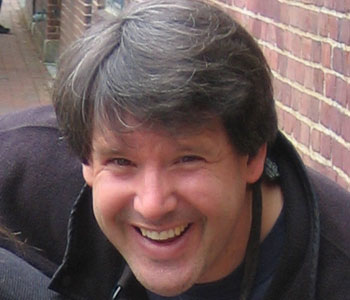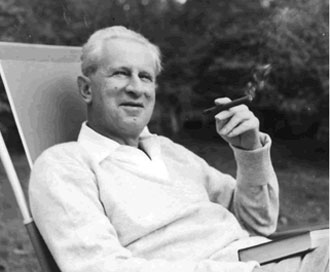
My book aims to challenge what I consider to be some pervasive views about the Frankfurt School during its period of exile in the United States and to re-evaluate the implications of this time in America. By rigorously examining the institutional and intellectual networks that the Frankfurt School sought to navigate (and sometimes join) in the United States, I cast the well-known history of Critical Theory into a new and unfamiliar light.
Typically, we see the members of Horkheimer’s Circle as classic exiles—marginal men because of the lonely territory that they staked out between Germany and America. In fact, members of the Frankfurt School, particularly Theodor W. Adorno, highlighted their de-centered status ironically as an empowering tool for observing and critiquing contemporary society. Nonetheless, the experiences of the group in exile were more typical of a classic immigrant’s tale. Although the shock of forced relocation and all of the traumas that accompanied their departure from Germany never left their minds, the Critical Theorists rapidly had to establish new professional and intellectual lives for themselves, a task that included assimilation and adaptation.
With the inspiration of the sociologists Pierre Bourdieu, Michelle Lamont, and Randall Collins, I have mapped the major academic and public intellectual networks that the Frankfurt School encountered, traversed, and sometimes entered in exile. Thus my book is a hybrid between the sociology of knowledge and the history of ideas—a combination that I have called the social history of ideas.
“My book is a hybrid between the sociology of knowledge and the history of ideas—a combination that I have called the social history of ideas.”
In a letter of June 29, 1940, Max Horkheimer eloquently developed one of the metaphors that became central to the history of Critical Theory in America. Writing to the actress and screenwriter Salka Viertel, Horkheimer despaired, “In view of everything that is engulfing Europe and perhaps the whole world our present work is of course essentially destined to being passed on through the night that is approaching: a kind of message in a bottle.”
This trope of the message in a bottle, the Flaschenpost, has been adopted by many of the historians and scholars of Critical Theory and has helped to reinforce the illusion of the Frankfurt School’s “splendid isolation” in the United States. The traditional account further proclaims that if Critical Theory was cast (like a message in a bottle) into a dark and angry sea during the 1930s and 1940s, it was spectacularly found and uncorked on the beaches of the U.S. by New Leftists, hippies, and flower children in the 1960s.
The image of the message in a bottle underplays the interactions between Critical Theory and American intellectual life during the Frankfurt School’s years in exile, and it simultaneously helps to overplay the relationship between the Horkheimer Circle’s legacy and the American New Left. That is why this metaphor of the Flaschenpost, as much as I find it poetic and powerful, needs to be broken and discarded.
A vast literature about both the Frankfurt School and its individual members exists and continues to grow. Nonetheless, as I began my own research, there remained substantial questions about the actual encounters that took place between members of the Frankfurt School and the American scholars who had contacts with the exiled Institute for Social Research. While both Martin Jay and Rolf Wiggershaus touched on this topic in both of their books, it was not a major focus for either. Thus, the theme of exile appeared to me as a vantage point that could perhaps help me to see Critical Theory, as well as the intellectual history of the United States, in a new way.
The realities of exile for a scholar are challenging enough, but the fact that the Frankfurt School arrived in the midst of the Great Depression made their situation more hazardous. Horkheimer could be ruthless with some of his associates, but he also proved to be a slick and successful operator. How strange to see these famous critics of advanced capitalist society and the culture industry being forced to participate and accommodate themselves to both in order to survive. Or perhaps it wasn’t particularly strange at all; perhaps they could only see these socio-cultural developments not by simply viewing them from the margins of American society, but by traveling into the belly of the beast.
In the wake of 1968, Herbert Marcuse and, by extension, his former colleagues from the Frankfurt School became forever linked with the student protests of that era. While most of the members and former members of the Horkheimer Circle had a deeply problematic relationship with the New Left, Herbert Marcuse’s enthusiastic support of the student movement solidified the connection between the Frankfurt School and student rebels. The press of the late 1960s heralded Marcuse as the “guru” of student rebellion. The evidence among the writings of American student leaders, however, presents a more problematic picture.
Marcuse and his critics were right about the difficulties faced by his readers in the United States. Most were not familiar with the style of rhetoric or the Germanic modes of thought that lay behind his writings for the New Left. At the same time, the student journals and underground newspapers from the era suggest a pattern of reception that is markedly different from what has traditionally been assumed.
When examining materials such as New Left Notes, Ramparts, and the wide array of underground newspapers linked to the counterculture, one is struck by how infrequently Marcuse’s name or ideas appear before the dramatic events of 1968. After the spring of 1968, when Marcuse actively sought to inspire and ally himself with the New Left, there is slightly more discussion, but still not as much as the popular press led people to believe. To some extent, Marcuse’s thought struggled to take root within a movement that progressively embraced increasingly extreme actions and enthusiastically touted its own anti-intellectualism.
Marcuse’s most substantial audience were graduate students and scholars sympathetic to many of the ambitions of the New Left. Marcuse and the Frankfurt School reminded them of the importance of social theory, the power of the culture industry, and the dangers of authoritarianism. Such admirers of the Horkheimer Circle emphasized these aspects of Critical Theory to criticize the rise of extremism that had arisen both in reaction to the student movement and within the student movement itself.
Critical Theory flourished amid the ruins of the American New Left after its shocking implosion. This reception of Critical Theory was not in the streets, but rather in the seminar room, a place where Critical Theory has since flourished, but also receded largely from public view.

“Marcuse’s thought struggled to take root within a movement that progressively embraced increasingly extreme actions and enthusiastically touted its own anti-intellectualism.”
My book aims to challenge what I consider to be some pervasive views about the Frankfurt School during its period of exile in the United States and to reevaluate the implications of this time in America.
First, like Jay and Wiggershaus before me, The Frankfurt School in Exile challenges the myth of a homogenous Horkheimer Circle by complicating the picture of Critical Theory and its theorists. By focusing on the Frankfurt School in exile, we glimpse Critical Theory at a moment of crisis and transformation, an era during which competing visions for the future of the institute and its intellectual program were openly debated. Second, my study dispels the common idea that the critical theorists isolated themselves in the United States, documenting the numerous contacts that emerged between members of the Horkheimer Circle and networks of American scholars and public intellectuals. Third, my project evaluates the impacts that American exile had on the Frankfurt School, as well as the influences that these critical theorists had on various communities of American thinkers.
Recently, intellectual history has been in crisis. It began with the widespread rise of social history; intellectual history increasingly was perceived by social historians as old-fashioned and elitist. Further problems arose as some leading intellectual historians began to take French theory more seriously. As a result, intellectual history became a brief lightening rod among historians for the culture wars of the 1980s and 1990s.
Writing in the wake of all of this, I hope that this book will offer a new path for intellectual historians—and more importantly one that will be appreciated by my fellow social historians. In the aftermath of last fall’s financial crisis, the timing seems right for a Marcuse (and Critical Theory) renaissance. But his ideas regarding the “new sensibility” must be rescued from his celebrity and his reputation as the “guru” of 1968. Only by re-examining Critical Theory’s academic reception during the 1960s can the Frankfurt School be rediscovered by the wide audience to whom it was addressed.


Thomas Wheatland was born and raised in Portland, Maine. He attended Brown University, Harvard University, and received his Ph.D. in history from Boston College. Wheatland worked in academic publishing at Harvard University Press for several years but returned to his first love, which is teaching. His sub-disciplinary focus is Modern German Intellectual History, but he teaches a wide variety of courses in Modern European and Modern German History at Assumption College in Worcester, Massachusetts. He has published several articles and book chapters on the history of the Frankfurt School. Wheatland currently lives in Cambridge, Massachusetts with his wife and two sons.